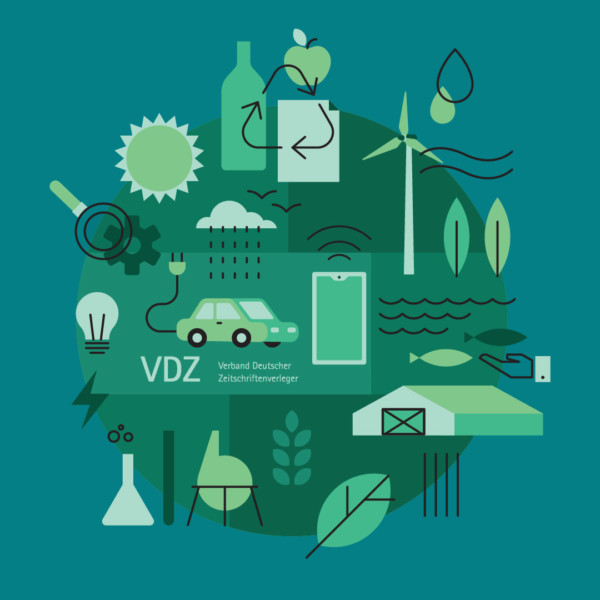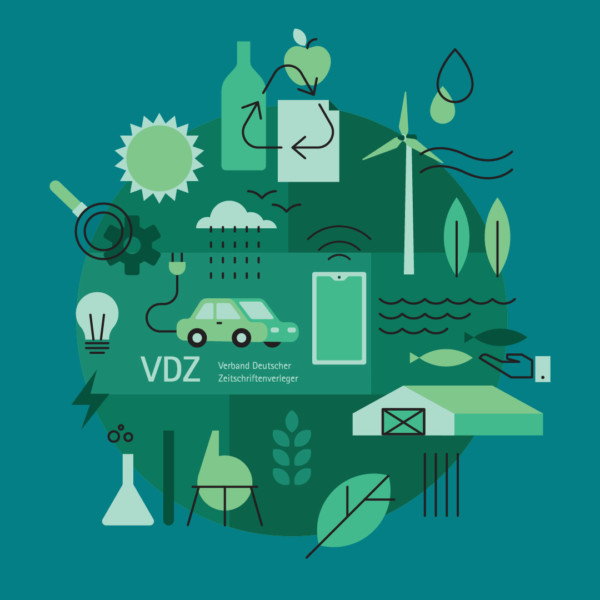
Green start-ups transforming our economy
Recent climate research presents dramatic findings that are making serious calls for moving away from a purely profit-oriented economy. More and more companies are fine-tuning sustainable products and services to meet people's growing demand for climate-friendly and socially responsible consumption - and more importantly, to protect the future of the planet. Of central importance are so-called Greentechs: start-ups that develop technology solutions for environmental and climate protection, thus challenging the traditional economy to revise old patterns.
(This is an excerpt from the text Greentech start-ups in focus: It won't get any greener? No way!, which was first published in the VDZ Start-up Report: Greentech [Autumn 2019]).

© VDZ Verband Deutscher Zeitschriftenverleger
Led by current debates on climate protection and global movements such as Fridays for Future, more and more founders are tinkering with green business ideas. If the Paris climate targets – which aim to limit global warming to below 2.0° Celsius – are to be met, even if only to a limited extent, a rapid change in climate and environmental protection is required throughout society. The buzzword of the hour: Green Economy. Because it combines three requirements: sustainable value chains, social inclusion and economic profitability. A central component here are Greentechs – green technology start-ups.
The booming business with sustainability
A thorough report about "Greentech made in Germany 2018" from the Federal Ministry for the Environment, Nature Conservation and Nuclear Safety (BMU) states that green products and services are making an increasing contribution to economic growth. While the share of the gross domestic product (GDP) accounted for by Greentechs was still 13 percent in 2013, by 2016 it had already climbed to 15 percent. "Greentech made in Germany" is also a real export hit: as early as 2016, German companies held 14 percent of the global Greentech market, whose market volume at that time was 3.2 trillion euros. Within Germany, a good quarter of the start-ups founded in the last ten years can now be classified as green. Let us take a closer look at some exciting examples.
Sustainability in road construction: Solmove
The start-up Solmove from Potsdam, founded in 2014, builds intelligent roads, meaning, the roads are also solar power plants at the same time. In the future, these will supply electric cars with clean electricity and information. Special photovoltaic modules, whose glass surface directs light onto the solar cells underneath, will be laid on asphalt for this purpose and conduct electricity into the public energy network. According to founder Donald Müller-Judex, a quarter of Germany's roads will be able to supply around 30 million electric cars with electricity. However, the technology is not yet fully developed: In Erftstadt, North Rhine-Westphalia, Environment Minister Svenja Schulze opened Germany's first solar bicycle lane in November 2018 – it was full 90 meters long. In the meantime, Solmove had to dismantle the road again after a smoldering fire broke out and the company was unable to rectify the faults within the deadlines set by the city of Erftstadt. The young company even had to answer for this in court. A bitter setback – but Solmove continues to test.
Distribution of recycled plastic: Cirplus
A global B2B online marketplace for recycled plastics? This is what Cirplus wants to set up – though not to be confused with the food rescuers from Sirplus. The aim of the start-up from Hamburg is to revolutionize the packaging industry. To achieve this, it is linking two fragmented and analog industries: Waste disposal and plastics processing. Founded in 2018, the company aims to close the plastic cycle in this way to 100 percent. Greentechs tackle a problem that could not be more topical: According to NABU (Nature and Biodiversity Conservation Union Germany), more than 400 million tons of plastic are now produced worldwide every year. More than ten million tons of it end up in the oceans every year, robbing animals and plants of their habitat. So it is more than urgent to make a change.
Information on even more exciting start-ups, as well as an overview of the political and economic support options and a forecast for the future, can be found here in full length.

